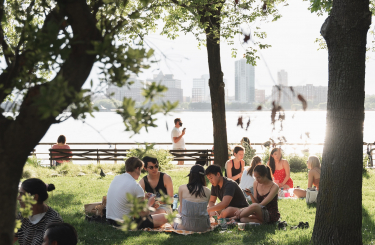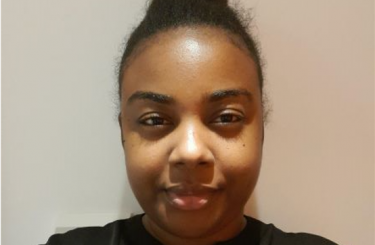Shifting power
Power - who holds it and how we shift it - has been a consistent theme across the events we’ve been hosting this month, including at a session we hosted with local funders in Southwark and Lambeth. A key issue we discussed with funders focused on those boroughs is the power of language. How do we move away from models that value funding applications written in a certain way? Lots of organisations and community groups do fantastic work but don’t necessarily have the capacity to write funding applications and articulate their work in a way that funders are used to seeing in applications.
The Giving Lab
We also heard from Gabrielle Allen from Impact on Urban Health and Keisha Simms, Principal Consultant at The Social Investment Partnership who shared learning from one of their latest programmes - the Giving Lab.
This programme is set up by The Social Investment Partnership and both Impact on Urban Health and the Wellcome Trust have joined as development partners. The Giving Lab brings people together to share ideas and identify changes that could improve the local community - in this case, Walworth in Southwark. As both Gabrielle and Keisha explained, this programme is all about shifting power and recognising that funding systems are not inherently equitable nor inclusive.
In many ways, the Giving Lab is about turning that funding model on its head - supporting communities to control the agenda about what changes they want to see in their local area. Rather than the decision-making being focused on the what, it’s about the who - finding the people who are motivated to make a change and supporting them to do that.
Placed-based giving is about listening and sharing power with local people.
Speaking of local communities, we also hosted a session during the Greater London Authority's (GLA) Festival of Ideas with several placed-based giving schemes, all of which aim to put more power into the hands of local people. Kristina Glenn, one of the advisors on London’s Giving, explained in the session, placed-based giving is about listening and sharing power with local people. Placed-based giving schemes are doing work with local people around how decisions are made, how funding is allocated and distributed. And speaking of shifting power, Rachel Engel from the Macquarie Group rightly pointed out that the expertise about what the needs are lies with local communities, people, and organisations. As a large corporate organisation, they are relying on the local community to tell them where the money is best placed.
Where do we go next?
So where do we go next? How do we harness and build on the momentum of doing things differently as so many organisations and funders have done during the pandemic? How do we avoid going back to the ‘normal’ way of doing things? If there’s anything we’ve learnt from the pandemic it’s that the status quo doesn’t serve London’s communities - indeed, inequalities have continued to grow, so there is a clear need to keep up this momentum of delivering differently and being more radical. Not being driven by our board, auditors, or due diligence systems, but instead taking more risks to deliver for London’s communities.
We need to change the system - it’s great we have a strong local community who can offer food to people who need it, but we shouldn’t have food banks in the first place.
This was a key point that came out of the second session we hosted during the GLA’s Festival of Ideas - which brought together community groups and funders to discuss what funders need to do differently to support communities as we recover from the pandemic. Mike Wilson from Pembroke House made this point eloquently: “we need to change the system - it’s great we have a strong local community who can offer food to people who need it, but we shouldn’t have food banks in the first place”.
The pandemic brought about huge cross-sector collaboration - one of the reasons for that was that everyone had a shared understanding of what the needs were and a vision to support those in need. We now need to make time and space to set out the vision for the future and at the heart of that, take a considered approach in who is setting out that vision.


